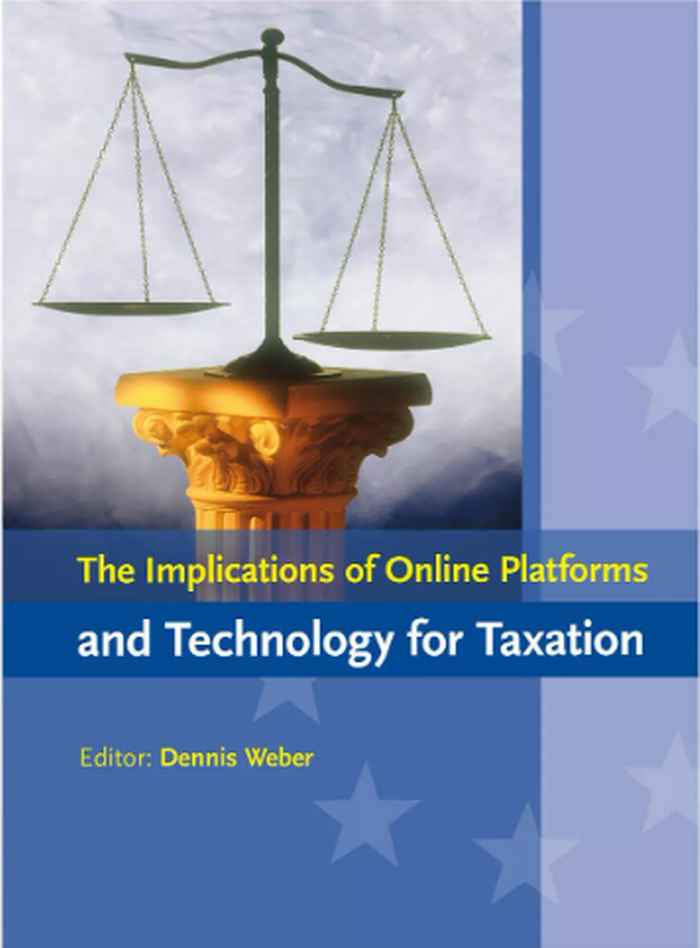UvA researchers publish book on the implications of online platforms and technology for taxation
23 May 2023

On 1 May 2023, the Cashless, Platform and Technology (CPT) project of the Amsterdam Centre for Tax Law (ACTL) of the University of Amsterdam (UvA) together with the Group for Research on European and International Taxation (GREIT) published a book titled "The Implications of Online Platforms and Technology for Taxation".
The book is a must read book for academics, tax authorities and practitioners seeking a comprehensive analysis of this topic. It explores a range of subjects, including the tax-reporting obligations of platforms in direct and indirect taxation, the legal status of digital workers and its income tax implications, the challenges and opportunities presented by distributed ledger technologies like blockchain, the tax implications of virtual currencies, crypto assets, NFTs and DeFi, and the importance of explainable AI in tax law.
Prof. Dr. Dennis Weber (Director of the ACTL’s CPT Project) comments: “I’m glad to present this book as one the first research outcomes of the Cashless, Platform and Technology (CPT) project of the ACTL”. In turn, Craig West, IBFD Senior Associate, noted “The authors, who are established and rising scholars from all around the globe, provide insightful and thought-provoking analysis that is sure to be of great interest to anyone interested in the implications of online platforms and new technologies on international tax and taxpayer rights”.
This must-read book is now available for purchase from the IBFD Bookstore
The book
Societies around the globe are evolving towards a model that, among other elements, will be heavily based on online platforms and new technologies such as artificial intelligence and blockchain. This transition towards a more platform-based and technology-powered society has been accelerated by the COVID-19 crisis. Pursuant to historical evidence, every time there has been a major technological change or global crisis, the tax system has evolved accordingly. Therefore, the evolution towards a platform-based and technology-driven society will also have a significant impact on the design and structure of 21st-century tax regimes. Indeed, this impact is already becoming apparent in certain areas of current systems, creating an urgent need to design tax rules that are easy to comply with, difficult to circumvent and respectful of taxpayers’ fundamental rights.
This publication is composed of an introduction and nine chapters written by established and rising scholars from all around the globe. It comprehensively discusses the implications of online platforms and technology on taxation and taxpayers’ rights. The purpose of this book is to provide academics, tax authorities and practitioners with a comprehensive examination of issues related to platforms’ tax-reporting obligations in the field of direct and indirect taxation (e.g. DAC7 and VAT); the legal status of digital workers and its income tax implications; the challenges and opportunities created by distributed ledger technologies (including blockchain) for tax systems; the tax implications of virtual currencies, crypto assets, NFTs and DeFi; and the need for explainable AI in tax law. The book is based on the presentations made during a conference organized by the CPT project of the Amsterdam Centre for Tax Law (ACTL) of the University of Amsterdam (UvA) together with the Group for Research on European and International Taxation (GREIT) in Amsterdam on 7 and 8 April 2022.
The authors
The contributors to this book are Benjamin Alarie, Marco Almada, Giorgio Beretta, Svitlana Buriak, Claudio Cipollini, Nevia Čičin-Šain, Annabelle Gawer, Sascha Jafari, Marie Lamensch, Anthony Niblett, Marta Papis-Almansa, Dennis Post, Raffaele Russo, Daniel Smit, Luisa Scarcella, Juan Manuel Vázquez, Dennis Weber.

About the CPT project
Whenever major economic or social changes occur, tax systems must follow suit. Working from the assumption that society is in the process of transitioning to a new economic model, accelerated by the corona crisis, the CPT project examines how tax systems can be designed and structured for a society based primarily on cashless payment methods, online platforms and digital technologies, such as artificial intelligence and blockchain. The ultimate goal is to arrive at concrete recommendations that not only help different stakeholders – such as governments and commercial organisations – address problems under current tax systems and/or introduce structural tax reforms, but also provide guidelines and/or minimum standards for the redesign of modern tax systems.
Contact
- Prof. dr. Dennis Weber, Director of the ACTL and CPT project’s General Supervisor, e-mail: d.m.weber@uva.nl
- Juan Manuel Vázquez, Academic Coordinator of the CPT project; j.m.vazquez@uva.nl